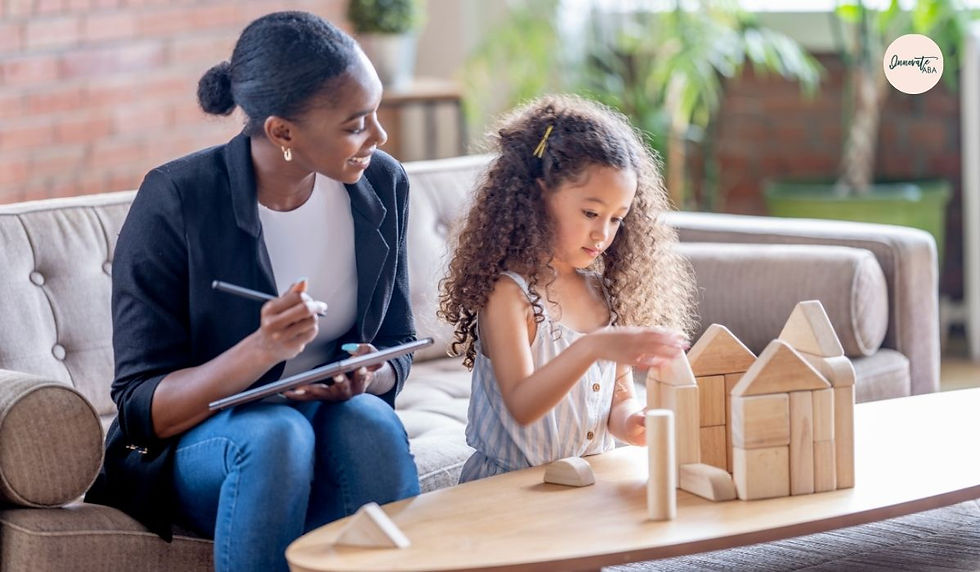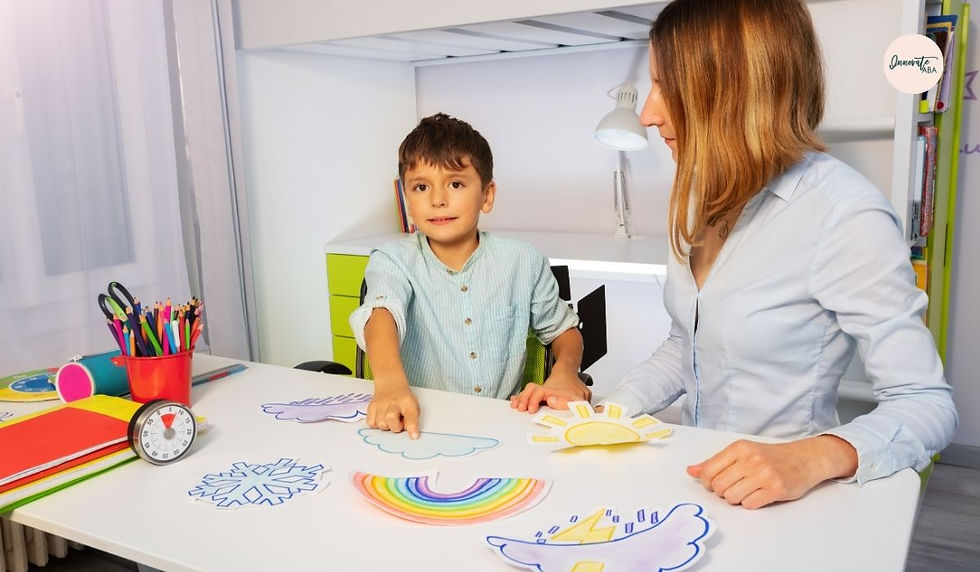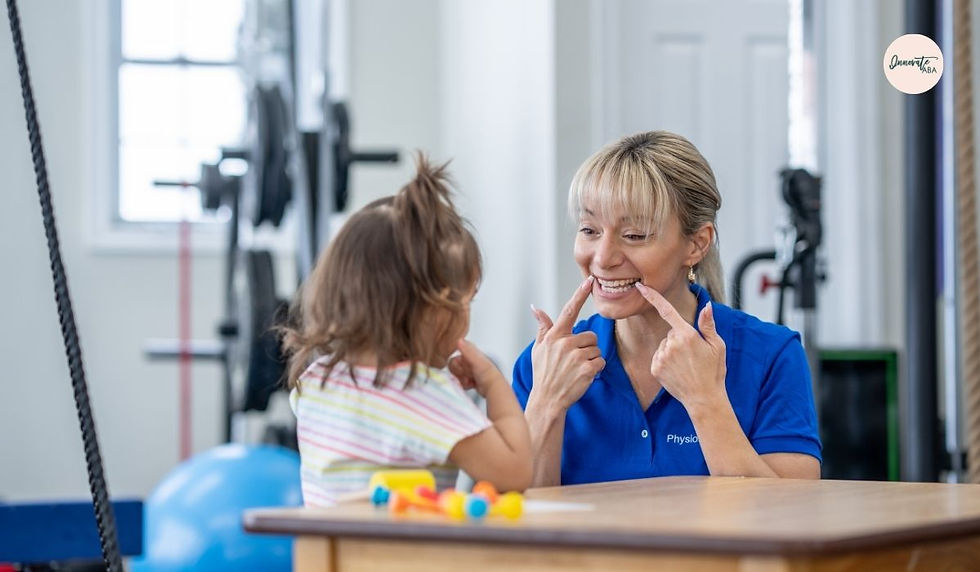Playdates: 7 Steps to Successful Social Interaction
- Innovate ABA
- Mar 19, 2024
- 7 min read

Playdates are a crucial component of a child's social development, providing opportunities for learning, cooperation, and the establishment of essential social skills. While playdates may seem like simple gatherings, creating a successful and positive social interaction requires careful planning and consideration. In this article, we will explore seven steps to ensure that playdates are enjoyable and beneficial for both children and their parents. Additionally, if you are seeking specialized support, consider exploring resources for ABA Therapy in Irvine, CA to enhance your child's social development further.
Communication is Key:
Additionally, it's essential to establish open lines of communication regarding logistics. Confirm the date, time, and location of the playdate, making sure it suits everyone's schedule. Clearly communicate drop-off and pick-up details, and provide contact information in case of any unforeseen circumstances. This transparency fosters a sense of trust between parents, ensuring a smooth and enjoyable experience for both children.
Moreover, discuss any special considerations or accommodations that may be necessary. If either child has specific needs or preferences, addressing these aspects beforehand will contribute to a more inclusive and positive playdate environment. Whether it's a favorite snack, comfort item, or any potential triggers, having this information will help create a supportive atmosphere for both children to engage in meaningful play.
Choose the Right Setting:
Furthermore, when choosing the right setting, it's crucial to take into account the specific interests and preferences of the children participating in the playdate. If they share a common interest, such as a particular hobby, sport, or type of play, selecting a setting that aligns with those interests can enhance the overall experience.
Consider the logistics of the chosen location as well. Ensure that it is easily accessible for all parties involved, taking into consideration transportation and proximity. If the playdate involves multiple children, confirm that the chosen setting can comfortably accommodate the group size, allowing for collaborative play and socialization.
Additionally, weather conditions can impact outdoor playdates, so it's wise to have a backup plan in case of inclement weather. Having a versatile setting that can adapt to different circumstances ensures that the playdate can proceed smoothly regardless of external factors.
Plan Engaging Activities:
Ensure a balance between structured activities and free play, allowing the children to express themselves and foster their creativity. Be mindful of the duration of each activity, keeping in mind the attention spans of the children. Having a well-thought-out schedule can help manage the flow of the playdate, preventing boredom and ensuring a smooth transition between different activities.

Consider any potential challenges or restrictions, such as allergies or safety concerns, when planning activities. Providing a variety of options ensures that all children can participate comfortably and feel included in the playdate experience.
Lastly, remain flexible and responsive to the interests and energy levels of the children. If they show enthusiasm for a particular game or activity, be willing to adjust the plan accordingly. A well-planned and adaptable set of activities contributes significantly to a successful playdate, fostering a positive atmosphere where children can bond, have fun, and create lasting memories together.
Encourage Cooperation and Sharing:
Highlight the significance of taking turns and sharing resources. Structured activities that involve sharing toys or taking turns in a game reinforce these essential social behaviors. Encourage positive reinforcement and praise when children demonstrate cooperation and sharing, emphasizing the positive impact on their playdate experience.
Consider incorporating games that inherently require collaboration, fostering a sense of unity among the children. Team-based activities not only promote cooperation but also provide an opportunity for them to learn from each other and build a sense of camaraderie.
Additionally, use these moments to gently address and resolve conflicts that may arise. Teach the children effective communication skills, helping them express their feelings and find solutions to disagreements in a constructive manner. By emphasizing these principles, you contribute to the development of strong social bonds and interpersonal skills in the participating children, creating a positive and inclusive playdate environment.
Provide Healthy Snacks:
Before the playdate, inquire about any dietary restrictions or allergies the children may have. This information is crucial in ensuring that the snacks offered are safe and suitable for everyone. By accommodating individual dietary needs, you create an inclusive environment where all children can partake in the snack time festivities.
During the playdate, encourage the children to share their snacks, promoting a sense of camaraderie and communal enjoyment. This sharing experience enhances social interaction, teaches generosity, and reinforces the idea of enjoying healthy foods together.
Consider incorporating interactive elements into snack time, such as letting the children assemble their own snacks or create simple, nutritious treats. This hands-on approach not only adds an element of fun but also empowers children to make wholesome food choices.
Be Mindful of Individual Differences:
Take the time to understand and accommodate specific preferences or sensitivities that may exist. Whether it's a particular toy, activity, or even a dietary preference, incorporating these elements into the playdate ensures that each child feels seen and valued. This attention to individual needs contributes to a positive and considerate atmosphere where all children can comfortably express themselves.
It's essential to communicate with the parents beforehand to gather insights into their child's unique traits and any specific considerations that should be taken into account. By doing so, you demonstrate a commitment to creating an environment that respects and accommodates the diversity of each child's preferences and needs.
Flexibility is key during the playdate to adapt activities based on the comfort and engagement levels of each child. Providing options for different types of play allows children to choose activities that align with their interests, fostering a sense of autonomy and enjoyment.
Provide Supervision and Support:
Create a safe environment by removing potential hazards and setting clear boundaries. Regularly check in on the children to address any emerging issues promptly. This hands-on approach not only ensures their physical safety but also fosters a sense of security and trust in the playdate setting.
Address conflicts or concerns with patience and empathy, taking the opportunity to teach valuable conflict resolution skills. Encourage the children to express their feelings and perspectives while guiding them towards finding mutually agreeable solutions. By actively managing conflicts, you contribute to the development of essential social and emotional skills that will benefit the children in various aspects of their lives.
Moreover, communicate openly with the parents, keeping them informed about the activities and any notable moments during the playdate. This transparency enhances trust and reinforces the collaborative effort to provide a positive and secure environment for the children.
Conclusion
Playdates are valuable opportunities for children to develop social skills, make new friends, and have fun. By following these seven steps, parents can create a positive and successful social interaction for their children. Effective communication, thoughtful planning, and a focus on inclusivity contribute to a memorable and enriching experience that fosters healthy relationships and social development. If you have any questions or would like further guidance on supporting your child's social development, feel free to reach out to us at Innovate ABA. At Innovate ABA, we're more than just a therapy provider – we're a thriving community. Our primary focus is on creating a collaborative environment where therapists and parents work hand in hand. Together, we cultivate a supportive culture to ensure that every child on the Autism spectrum receives the compassionate and effective treatment they deserve. Our ultimate objective is simple: to offer parents reassurance and peace of mind. We approach each child with empathy, respect, and boundless patience. Specializing in Applied Behavior Analysis (ABA) therapy for children aged 1-6, our experienced therapists dedicate themselves to delivering transformative care that goes above and beyond expectations. We invite you to join us in shaping a brighter future for your child, where their potential is nurtured and celebrated.

FAQs
Why are playdates important for a child's social development?
Playdates provide valuable opportunities for children to learn, cooperate, and develop essential social skills. Interacting with peers in a playdate setting fosters communication, teamwork, and the ability to navigate social situations.
How can parents ensure effective communication for a successful playdate?
Establish open lines of communication by confirming date, time, and location details. Share contact information and discuss any special considerations or accommodations for the children involved. This transparency builds trust between parents, contributing to a smooth and enjoyable playdate experience.
What factors should be considered when choosing the right setting for a playdate?
Consider the specific interests and preferences of the children. Choose a setting that aligns with shared interests, is easily accessible, and can accommodate the group size comfortably. Have a backup plan for inclement weather to ensure the playdate can proceed smoothly.
How can parents plan engaging activities for a playdate?
Balance structured activities and free play, considering the children's attention spans. Plan activities with consideration for potential challenges or restrictions, ensuring inclusivity. Remain flexible and responsive to the children's interests, adjusting plans accordingly for a positive and memorable playdate experience.
Why is encouraging cooperation and sharing important during playdates?
Highlighting the significance of taking turns and sharing resources reinforces essential social behaviors. Team-based activities promote collaboration, positive reinforcement, and the development of effective communication skills, contributing to strong social bonds among children.
How can parents provide healthy snacks during playdates?
Inquire about dietary restrictions beforehand to ensure safe snacks for all children. Encourage snack-sharing to enhance social interaction, and consider incorporating interactive elements into snack time, such as letting children assemble their own treats.
Why is it important to be mindful of individual differences during playdates?
Understanding and accommodating specific preferences or sensitivities ensures that each child feels valued. Communicate with parents beforehand to gather insights and be flexible during the playdate to adapt activities based on individual comfort levels, fostering autonomy and enjoyment.
How can parents provide supervision and support during playdates?
Create a safe environment by removing hazards and setting clear boundaries. Regularly check in on the children, addressing conflicts with patience and empathy. Open communication with parents enhances trust, reinforcing the collaborative effort to provide a positive and secure playdate environment.




Comments